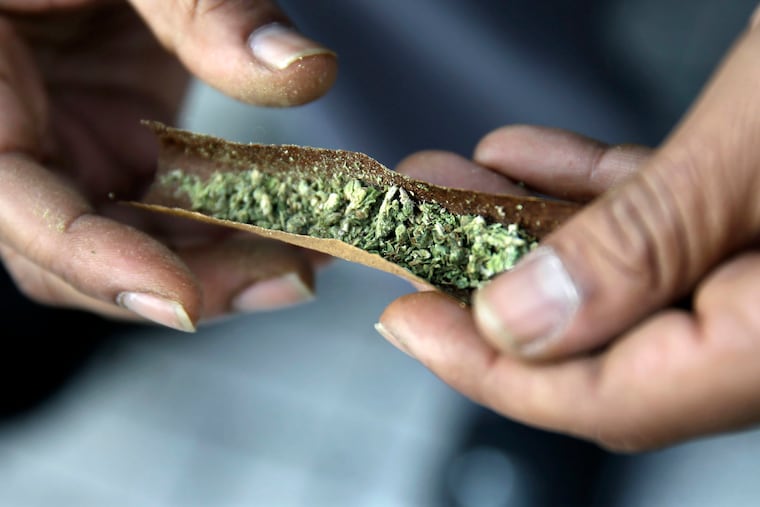New Jersey has legalized weed. Here’s why Pa. may take a different path.
The GOP remains opposed. But "if you’re to the right of South Dakota on anything, maybe you should rethink this,” said Lt. Gov. John Fetterman.

New Jersey voters this week legalized recreational cannabis. Without Republican support, it’s unlikely that the Keystone State will follow anytime soon.
“As long as we’re in the middle of a declared opioid emergency, we shouldn’t be legalizing another drug," said Jason Gottesman, spokesman for Pennsylvania House Majority Leader Kerry Benninghoff (R., Centre). “On top of that, revenue projections are that it will only bring in about $200 million a year and that money would only go to new spending.”
Gottesman said there is “no serious discussion” among GOP legislators for a measure similar to the Garden State’s or for expanding the medical marijuana program to include adult recreational use.
The Senate Majority leader was equally adamant. Jake Corman (R., Centre) repeated a statement he made in September after Gov. Tom Wolf urged legislators to consider legalization as a way to help fill the pandemic-driven budget shortfall.
“It was Winston Churchill who said: ‘Never let a good crisis go to waste.’ We have long maintained that state laws should be changed because they are good policy for the people of Pennsylvania – not because of their potential to generate money,” Corman said. “Movement on this issue should not be expected this fall.”
Democrats and cannabis industry mahoffs believe Republican opposition is shortsighted.
“Forty percent of our state’s population will be a short drive from a Candy Land of legal weed,” Lt. Gov. John Fetterman said.
With this week’s vote, 15 states now will allow adults 21 and over to consume marijuana.
“The only thing that really won Tuesday night was cannabis,” said Adam Goers, vice president of corporate affairs at Columbia Care, a multistate marijuana grower and retailer. “It was the only thing voters could agree on.”
In addition to New Jersey, voters in Arizona, Montana and South Dakota also passed measures for legalization. Arizona’s measure passed 60% to 40%; Montana’s passed 58% to 42%; South Dakota passed 54% to 46%.
“If you’re to the right of South Dakota on anything, maybe you should rethink this,” Fetterman said.
Gottesman, the spokesman for Benninghoff, said Democratic talking points don’t add up.
“When [Republicans] talk about privatizing our liquor stores, we show we need privatization because Pennsylvanians go across the border for better selection and price,” Gottesman said. “The Dems say there is no border bleed. They can’t have it both ways.”
Proponents say they believe that if Pennsylvanians were to vote on legalization, voters would overwhelmingly support it. But because there is no provision in the state constitution that would allow state residents to decide the matter, it’s left up to the legislature.
“The Republicans are willfully thwarting the democratic process in the state and turning down $5 billion in revenue over the next two decades,” Fetterman said. “And they’re turning down tens of thousands of jobs and millions in infrastructure investment.”
Charlie Gerow, a lobbyist in Harrisburg, is the rare Republican who is actively pro-legalization.
“I think it’s a march to the inevitable,” said Gerow, the CEO of Quantum Communications. “It’s just a question of how quickly we get there.”
Economic forces may ultimately bring Republican legislators to the table, Gerow said.
“That’s how you got expanded casino gaming in Pennsylvania,” Gerow said. “If you let Pennsylvania do here what they’re already doing elsewhere, you’ve got a lot of tax revenue.”
Meredith Buettner was appointed executive director of the Pennsylvania Cannabis Coalition in June.
The New Jersey vote “lights a fire under our legislators,” said Buettner, a self-described “former Republican operative.”
She fears that needed taxes will be lost across the river.
“A [marijuana] dispensary is like having a favorite bar,” Buettner said. “There’s a danger of a significant loss of revenue that is not necessarily 100% reversible" if Pennsylvania doesn’t follow suit.
Steven Hawkins, the executive director of the national Marijuana Policy Project, remains optimistic.
“Fiscal conservatives should be supportive of marijuana legalization. Especially if it’s a choice between taxes going up and cuts in essential services. The market is already there. It’s just illicit at the moment, so why not tax and regulate it now?”
Hawkins said the MPP expects to put pressure on state Republicans by committing resources to educational outreach, putting a lobbyist in Harrisburg, and hiring a state organizer.
“We had five successful ballot initiatives and three of those passed in states that voted for Donald Trump,” Hawkins said. “This is not a red state/blue state issue.”
With the large margins of victory for legalization in some of the deepest of Red States, executives at marijuana companies are hopeful about their Pennsylvania prospects.
“Cannabis could create tens of thousands of jobs, hundreds of millions in infrastructure build, and hundreds of millions in tax revenues for Pennsylvania,” said Erich Mauff, a former Deutsche Bank managing director and co-founder the multi-state marijuana group Jushi Holdings.
New Jersey has only 12 operating cannabis growers and dispensary owners. Pennsylvania, he notes, will have 33 growers and already has more than 80 marijuana retailers scattered across the state. With little effort, the Keystone State could easily segue to an adult recreational market, Mauff said.
“Pennsylvania could jump New Jersey like there’s no tomorrow,” said Mauff, whose Jushi Holding operates Beyond/Hello dispensaries in Pennsylvania.
"You already have a wonderfully managed program. They’re in a wonderful position to unleash a torrent of jobs and infrastructure. The stores in Pennsylvania will be better, the selection will be better, the prices will be better. We could become the best in class.
“What is holding them up?”